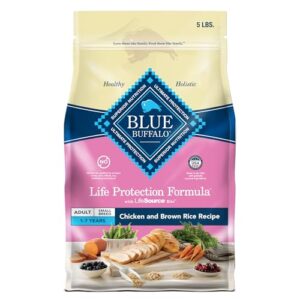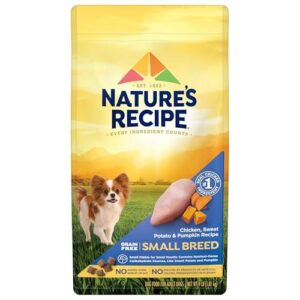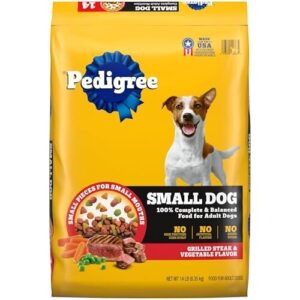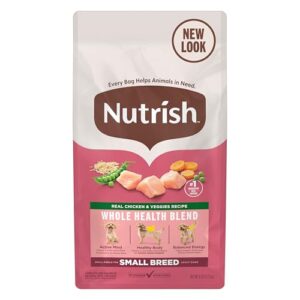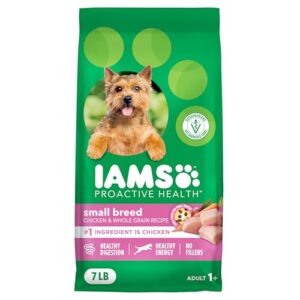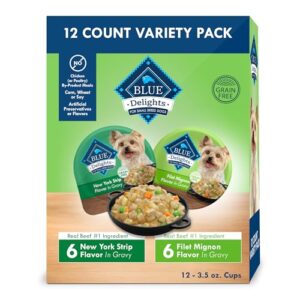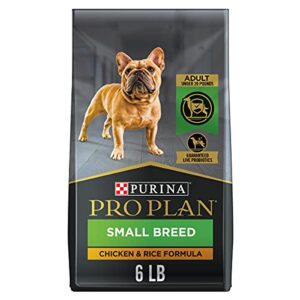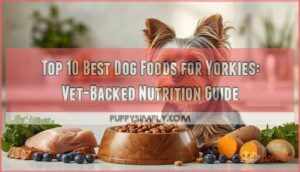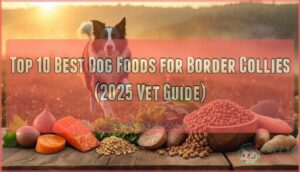This site is supported by our readers. We may earn a commission, at no cost to you, if you purchase through links.
Your Chihuahua wolfs down meals in seconds, while your neighbor’s Labrador grazes leisurely—and there’s real science behind that difference. Small breed dogs burn calories at nearly double the rate of their larger counterparts, requiring up to 40 calories per pound of body weight daily just to maintain their energy levels.
This metabolic intensity means the food in your small dog’s bowl isn’t just about filling their stomach—it’s about delivering concentrated nutrition in every bite-sized piece. The wrong formula can leave tiny breeds struggling with blood sugar crashes, dental problems from oversized kibble, or nutritional gaps that compromise their long-term health.
Selecting food specifically designed for small breeds meets their unique physiological needs, from appropriately sized pieces that prevent choking to calorie-dense formulations that fuel their fast-burning metabolisms.
Table Of Contents
- Key Takeaways
- Key Nutritional Needs of Small Breed Dogs
- Choosing Small Breed Dog Food by Life Stage
- Important Features in Small Breed Dog Foods
- Factors to Consider When Selecting a Brand
- Top 10 Best Dog Foods for Small Breeds
- 1. Blue Buffalo Small Breed Dog Food
- 2. Nature’s Recipe Grain Free Dog Food
- 3. Pedigree Small Dog Food
- 4. Nutrish Small Breed Dog Food
- 5. Iams Small Breed Dog Food
- 6. Kibbles n Bits Small Breed Dog Food
- 7. Blue Buffalo Natural Dog Food
- 8. Purina Pro Plan Small Breed Dog Food
- Royal Canin Small Breed Adult Dog Food
- The Farmer’s Dog Turkey Fresh Recipe
- Special Dietary Considerations for Small Breeds
- Transitioning and Feeding Tips for Small Dogs
- Frequently Asked Questions (FAQs)
- What is the best dog food for a small dog?
- What do small dogs need to eat?
- What is the best dog food for weight loss?
- Which dog food should I Feed my Dog?
- How much dog food should I feed my small dog?
- Should small dogs eat only small-size kibble?
- When should I switch my small dog to a senior dog food?
- Is my puppy considered a small breed… or a medium breed?
- When should I switch my puppy to adult dog food?
- What food is best for small breeds?
- Conclusion
Key Takeaways
- Small breed dogs require calorie-dense food delivering 40+ calories per pound daily due to metabolic rates nearly double those of larger breeds, making concentrated nutrition essential to prevent blood sugar crashes and maintain energy levels.
- Quality small breed formulas must include 20-30% protein from named animal sources, 8-15% healthy fats with omega-3s for cognitive and joint support, and appropriately sized kibble to prevent choking hazards in dogs with narrower esophagi.
- Life stage matters significantly—puppies need 25-30% protein with DHA for brain development and 3-4 daily meals to prevent hypoglycemia, while seniors require easily digestible proteins with glucosamine and 10-20% calorie reduction to maintain lean mass without weight gain.
- AAFCO certification confirms baseline nutritional adequacy, but you should also verify brand recall history, ingredient sourcing transparency, and match formulas to your dog’s specific needs like sensitive stomachs, weight management, or grain sensitivities rather than relying solely on marketing claims.
Key Nutritional Needs of Small Breed Dogs
Your small dog’s body works differently than a big dog’s—and that means their food needs to be different too. Small breeds burn through energy faster, need more concentrated nutrition, and face unique challenges like choking risks if kibble isn’t sized right.
Let’s look at the four essential nutritional factors you need to understand before choosing their food. Understanding these factors is especially important if your dog has specific health needs, like choosing dog food for liver disease that supports their condition.
Higher Metabolic Rates and Calorie Requirements
Your small breed dog burns calories at a markedly faster rate than larger dogs—often requiring 40 or more calories per pound of body weight daily. This elevated metabolic rate means you’ll need to focus on calorie-dense small breed dog food that delivers adequate energy needs without overfeeding.
Regular calorie calculation based on your dog’s activity level ensures proper nutrient balance and dietary adjustments as their nutritional requirements evolve. A well-planned Saint Bernard homemade dog food recipe can help you control portions and meet their specific caloric needs at every life stage.
Ensuring the accuracy of scientific study summaries is essential, and researchers use methodological rigor to validate their findings.
Importance of High-Quality Protein Sources
Protein quality directly shapes your small dog’s lean muscle growth and overall vitality. Look for high biological value protein sources—like chicken, turkey, or fish—that deliver all essential amino acids in the right proportions for ideal nutrient absorption and digestive health.
Quality matters because:
- Premium proteins support aging muscle preservation
- Complete amino acid profiles boost satiety and metabolism
- Highly digestible sources improve stool quality
- Poor-quality proteins add empty calories without benefits
Role of Healthy Fats and Essential Nutrients
Beyond protein, healthy fats deliver concentrated energy your petite companion needs. Essential fatty acids strengthen cell membranes and boost skin and coat health—omega-3s like DHA and EPA sharpen cognitive function and support joint comfort.
Fat solubility matters too: vitamins A, D, E, and K require dietary fats for proper absorption, directly impacting vision, bone strength, and metabolic balance in canine nutrition for small breed dogs.
Necessity of Small Kibble Size for Safety
Right-sized kibble prevents choking hazards and airway obstruction in your toy or miniature companion. Small breed dog food features bite-sized pieces that match your pup’s narrower esophagus, reducing aspiration risk during meals.
Kibble design matters—oversized chunks can trigger gagging or regurgitation, especially in dogs with dental issues. Smart swallowing safety starts with proportionate pieces that support healthy canine dietary needs without compromise.
Choosing Small Breed Dog Food by Life Stage
Your small dog’s nutritional needs shift as they grow from a bouncing puppy to a calm senior. Each life stage brings different demands for calories, protein, and specific nutrients that support their changing bodies.
Let’s look at what your dog needs during puppyhood, adulthood, and their golden years. For more tips on choosing a diet that meets AAFCO standards at every life stage, check out this guide to the best dog food for Sheepadoodles.
Small Breed Puppy Nutritional Requirements
Your puppy’s rapid growth demands more than just smaller portions—it requires precise nutrient balance. Small breed puppy food should deliver 25–30% protein from named animal sources to build lean muscle, plus DHA for brain development.
Because tiny stomachs can’t hold much, you’ll need calorie-dense formulas and frequent feeding schedules—three to four meals daily—to fuel growth stages without risking hypoglycemia in these vulnerable little ones. Working with your vet to establish proper gabapentin dosing for dogs and other medications becomes especially important when managing pain or anxiety in growing puppies.
Adult Small Dog Dietary Needs
Once your small breed reaches maturity, calorie management becomes critical. Adults need 1.0–1.8 times the resting energy requirement per pound to sustain their higher metabolic rates without tipping into obesity. Choosing high-quality food formulated for small breeds helps you hit those precise calorie targets while delivering the nutrients tiny dogs need to thrive.
You’ll want 20–30% protein from quality animal sources for lean muscle maintenance, balanced with 8–15% fat to support skin, coat, and digestive health.
Split meals into three or four portions daily to stabilize blood glucose and prevent overeating.
Senior Small Dog Diet Adjustments
As your small breed crosses seven years, you’ll notice aging nutrition needs shift markedly. Senior dog food formulas prioritize easily digestible proteins to preserve lean mass, while glucosamine and chondroitin support joint health.
Calorie management prevents unwanted weight gain, so reduce portions by 10–20% based on activity. Omega-3s from fish oil aid digestive care and maintain coat quality in these golden years.
Important Features in Small Breed Dog Foods
When you’re comparing small breed dog foods, certain features matter more than others for your pup’s health and safety. Understanding what to look for on the label helps you separate marketing claims from real nutritional value.
Let’s break down the most important features that every quality small breed formula should include.
Calorie Density and Feeding Guidelines
Getting the calorie content right is where your small breed’s health journey truly begins. Your dog’s energy needs depend on weight, activity level, and life stage, making accurate calorie calculation essential for maintaining ideal body condition.
Key Feeding Strategies for Small Breed Dog Care:
- Check calorie density (usually 350-450 kcal per cup) to guarantee proper nutrient balance
- Use gram-scale measurements for precise meal portioning with energy-dense formulas
- Follow manufacturer feeding schedules that account for your dog’s specific weight range
- Divide daily calories into 2-3 meals to stabilize energy throughout the day
- Monitor body condition weekly, adjusting portions by 10-15% as needed for ideal dog nutrition and health
Benefits of Whole Grains and Fiber
Whole grains aren’t filler—they’re functional fuel for your small breed’s digestive balance and sustained energy.
Fiber benefits extend beyond regular bowel movements; soluble and insoluble fibers support gut health by promoting beneficial microbiota and enhancing nutrient absorption.
These dog food ingredients deliver B vitamins, iron, and magnesium while improving satiety, helping your pup feel satisfied without overeating—essential for small breed dog nutrition.
Inclusion of DHA, EPA, and Antioxidants
DHA effects go far beyond basic canine dietary needs—this omega-3 powerfully aids brain development and may sharpen learning in young dogs, while EPA sources like fish oil tackle inflammation and boost joint comfort in your small breed.
Pair these with antioxidants, and you’re covering multiple fronts:
- Fatty Acid Benefits: Higher metabolic rates in small breeds mean they need adequate omega-3 supplements for proper tissue incorporation and cognitive aid.
- Antioxidant Role: Vitamins E and C guard cell membranes and skin barrier function against oxidative stress.
- Dosing Precision: Typical ranges sit between 20–80 mg combined DHA/EPA per kg body weight daily—follow veterinary guidance to avoid GI upset.
These dog food ingredients form a science-backed foundation for sturdy pet nutrition.
AAFCO Nutritional Adequacy Statement
Before you buy, check that package for an AAFCO statement—it confirms the food meets established nutritional standards for your small breed’s life stage. This regulatory compliance marker tells you the manufacturer followed AAFCO standards through either feeding trials or formulation methods, matching nutrient profiles to your dog’s nutritional needs.
While it doesn’t guarantee superiority, it signals baseline adequacy in pet nutrition and proper label claims.
Factors to Consider When Selecting a Brand
Picking the right dog food brand isn’t just about grabbing what’s on sale or what has the cutest packaging. You need to look beyond marketing claims and consider what really matters for your small dog’s health and safety.
Here’s what to keep in mind as you compare your options.
Reputation and Recall History
When you’re shopping for small breed dog food, brand trust matters more than you might think. Check the FDA’s consumer alerts and recall trends before buying—brands with multiple voluntary recalls in recent years often show gaps in safety ratings and regulatory compliance.
Pet food safety isn’t just marketing talk. Independent dog food reviews can help you spot patterns and protect your pup from preventable risks.
Ingredient Quality and Sourcing
Beyond a brand’s recall record, you need to know where your small breed dog food actually comes from. Ingredient testing and sourcing transparency separate trusted manufacturers from questionable ones. Look for brands that verify supplier origins and maintain supply chain traceability.
- Third-party testing protocols for nutrient consistency
- Clear documentation of ingredient origins
- Regular quality audits of manufacturing facilities
- Label accuracy verification against actual formulations
These standards protect your pup’s health every day.
Price Point and Budget Considerations
Quality ingredients come at a cost, but smart budget planning helps you afford the best small breed dog food without breaking the bank. Price comparison across formulas reveals that calorie-dense recipes often deliver better cost efficiency—you’ll feed less per day.
Value analysis should weigh ingredient quality against feeding amounts.
Look for savings strategies like subscription discounts or bulk purchases to stretch your pet wellness budget further.
Veterinary Recommendations and Prescription Options
Your veterinarian often acts as your best resource when selecting small breed dog food, especially if your pet has underlying health conditions. Prescription diets target specific issues—renal support, liver care, or gastrointestinal sensitivity—under medical consultation.
Therapeutic nutrition requires veterinary guidance to guarantee proper nutrient levels. Pet insurance may offset costs, and regular monitoring through blood work confirms your small breed’s pet health and wellness goals stay on track.
Top 10 Best Dog Foods for Small Breeds
After weighing factors like ingredient quality, nutritional balance, and your dog’s specific needs, you’re ready to see the brands that consistently deliver for small breeds.
I’ve selected ten foods that meet AAFCO standards and offer the calorie density, protein levels, and small kibble sizes your tiny companion requires. Each option below has earned its spot through proven nutrition, safety records, and real-world results for dogs under 20 pounds.
1. Blue Buffalo Small Breed Dog Food
When you’re searching for reliable Small Breed Dog Nutrition, Blue Buffalo Life Protection stands out with real chicken as its first ingredient—no fillers like corn, wheat, or soy.
Your small dog gets calorie-dense Dog Food packed with omega fatty acids for a glossy coat and smaller kibble designed specifically for tiny mouths. The LifeSource Bits add antioxidants for Pet Wellness and immune support.
Dog Food Advisor rates it highly for Food Quality, though some pups may need time adjusting to the stronger aroma and premium price point.
| Best For | Small breed dog owners looking for high-quality, protein-rich food with natural ingredients and immune support, who don’t mind paying a bit more for premium nutrition. |
|---|---|
| Primary Protein | Chicken |
| Form | Dry |
| Age Range | Adult |
| Breed Size | Small |
| Weight | 5 lbs |
| Grain Status | Grain-Inclusive |
| Additional Features |
|
- Real chicken as the first ingredient with no cheap fillers like corn, wheat, or soy
- Small kibble size makes it easier for tiny dogs to chew and digest
- LifeSource Bits provide antioxidants and support for immune system health
- Higher price point compared to many other small breed dog foods
- Strong smell when you open the bag that some owners find off-putting
- May cause digestive issues in some dogs during the transition period
2. Nature’s Recipe Grain Free Dog Food
If your pup battles digestive troubles, Nature’s Recipe Grain Free delivers Protein Sources like real chicken first, with Regulatory Compliance backing every batch. This Small Breed formula uses Fresh Ingredients—sweet potato and pumpkin—for Grain Free Benefits without corn, wheat, or soy.
The Small Kibble Design fits tiny mouths perfectly, and Dog Food Advisor highlights its gut-friendly fiber content. Pet Food Reviews praise its clean label, though some Small Dog Food shoppers note it costs a bit more and availability varies by location.
| Best For | Small breed adult dogs with sensitive stomachs or grain allergies who need digestible, high-quality protein and fiber. |
|---|---|
| Primary Protein | Chicken |
| Form | Dry |
| Age Range | Adult |
| Breed Size | Small |
| Weight | 4 lbs |
| Grain Status | Grain-Free |
| Additional Features |
|
- Real chicken as the first ingredient provides quality protein for muscle health
- Sweet potato and pumpkin support healthy digestion and gut function
- Small kibble size makes it easy for little dogs to chew and eat
- More expensive than many competing small breed formulas
- Can be hard to find in some stores or regions
- Some dogs may refuse to eat it despite the quality ingredients
3. Pedigree Small Dog Food
Budget-conscious doesn’t mean low-quality when you pick Pedigree Small Dog Food. This Pedigree Nutrition formula uses Small Kibble sized for tiny jaws, with 36 vitamins and minerals plus omega-6 fatty acids for coat health.
Dog Food Reviews on Dog Food Advisor note its affordability, and Pet Food Reviews confirm the Feeding Guidelines help Pet Owner Tips beginners nail portion control.
Small Breed owners appreciate the whole-grain recipe, though some Small Dog Food shoppers flag artificial colors and preservatives in the ingredient list.
| Best For | Pet owners on a budget who need a complete diet for their small breed dogs and don’t mind artificial ingredients. |
|---|---|
| Primary Protein | Steak |
| Form | Dry |
| Age Range | Adult |
| Breed Size | Small |
| Weight | 14 lbs |
| Grain Status | Grain-Inclusive |
| Additional Features |
|
- Small kibble pieces make it easy for tiny dogs to chew and digest
- Packed with 36 vitamins, minerals, and amino acids plus omega-6 for healthy skin and coat
- Affordable price point with clear feeding guidelines that help you get portions right
- Contains artificial colors (Red 40, Yellow 6, Blue 2) and preservatives like BHA
- Not suitable for dogs with food allergies or specific dietary restrictions
- Some picky eaters may turn their nose up at the flavor
4. Nutrish Small Breed Dog Food
Real chicken leads the ingredient list in Nutrish Small Breed Dog Food, delivering recognizable protein your small dog needs for lean muscle and energy. This Nutrish Ingredients formula features Small Breed Nutrition with added vitamins, minerals, and antioxidants—plus kibble designed for tiny mouths.
Pet Owner Reviews praise its palatability, though you should know the Nutrish Recall History includes past incidents across the broader product line.
Dog Food Advisor notes its value positioning, making it accessible for budget-focused households seeking AAFCO-compliant Small Dog Food that promotes Small Breed Dog Health through balanced, straightforward nutrition.
| Best For | Budget-conscious owners of small breed dogs who want real chicken as the first ingredient and don’t mind a value-tier brand with past recall incidents in its broader product line. |
|---|---|
| Primary Protein | Chicken |
| Form | Dry |
| Age Range | All Life Stages |
| Breed Size | Small |
| Weight | 6 lbs |
| Grain Status | Grain-Inclusive |
| Additional Features |
|
- Real chicken leads the ingredient list, providing recognizable protein for lean muscle and energy in a small-kibble format that’s easy for tiny mouths to chew.
- AAFCO-compliant for all life stages with added vitamins, minerals, and antioxidants to support overall health, active minds, and balanced energy.
- Value-tier pricing makes it accessible for budget-focused households while still delivering complete and balanced nutrition for small breeds.
- The brand has experienced periodic recalls across its product portfolio, with past incidents reporting ingredient or processing concerns.
- May not suit dogs with individual sensitivities or allergies to specific ingredients, requiring owners to monitor for sensitive stomach signs.
- Positioned as a value-tier option below premium diets, which may concern owners seeking higher-end formulations or specialized nutrition.
5. Iams Small Breed Dog Food
Iams Nutrition delivers a mid-range formula specifically customized for dogs under 20 pounds, balancing Dog Food Quality with affordability. The Small Kibble design helps prevent choking, while real chicken provides muscle-supporting protein alongside omega fatty acids for healthy skin and coat.
This Small Breed Dog Food meets AAFCO standards and includes fiber and prebiotics to support digestive health. Pet Owner Reviews highlight good palatability, though some dogs with food sensitivities may need alternatives.
When making your Dog Food Selection, verify the current formula’s Breed Specificity and always shift gradually for ideal Small Dog Nutrition.
| Best For | Small breed adult dogs (20 pounds or less) whose owners want affordable, vet-formulated nutrition with digestive support and smaller kibble size. |
|---|---|
| Primary Protein | Lamb |
| Form | Dry |
| Age Range | Adult |
| Breed Size | Small |
| Weight | 5 lbs |
| Grain Status | Grain-Inclusive |
| Additional Features |
|
- Real chicken as the first ingredient provides quality protein for lean muscle maintenance
- Smaller kibble size makes chewing easier and safer for tiny mouths
- Includes fiber, prebiotics, and omega fatty acids to support digestion, skin, and coat health
- May not work for dogs with food sensitivities or specific allergies
- Some picky eaters might reject the flavor or texture
- Contains by-product meals in certain formulas, which some owners prefer to avoid
6. Kibbles n Bits Small Breed Dog Food
Kibbles n Bits Small Breed Dog Food offers an economical option at just 3.5 pounds, featuring savory bacon and steak flavors with crunchy and tender bits. The Small Kibble Size accommodates tiny mouths, though the formula relies heavily on whole corn and soybean meal rather than premium animal proteins.
While it meets basic Nutrient Balance standards across all life stages, the inclusion of BHA preservatives may concern owners managing Food Allergies or seeking superior Pet Nutrition.
For Dog Food Selection focused on Dog Wellness and Canine Dietary Needs, you’ll find this suits tight budgets better than demanding Small Dog Nutrition requirements.
| Best For | Budget-conscious owners of small dogs who prioritize affordability over premium ingredients and don’t have pets with food sensitivities. |
|---|---|
| Primary Protein | Chicken |
| Form | Dry |
| Age Range | Adult |
| Breed Size | Small |
| Weight | 7 lbs |
| Grain Status | Grain-Inclusive |
| Additional Features |
|
- Affordable price point makes it accessible for owners on tight budgets
- Small kibble size designed specifically for tiny mouths and easy chewing
- Meets AAFCO standards for complete and balanced nutrition across all life stages
- Relies heavily on corn and soybean meal instead of high-quality animal proteins
- Contains BHA preservatives that may be concerning for health-conscious pet owners
- Not suitable for dogs with food allergies or sensitivities due to filler ingredients
7. Blue Buffalo Natural Dog Food
Blue Buffalo Life Protection places real beef or chicken first, offering Natural Ingredients you can recognize. Their Manufacturing Process includes whole grains and no by-product meals—a Protein Sources upgrade that aids Small Breed metabolism and Nutrient Balance.
While Food Recalls have occurred across product lines, their AAFCO-approved formulas address small dog nutrition with thoughtful antioxidant blends. For Dog Food Selection emphasizing wholesome quality over rock-bottom pricing, you’ll appreciate how this brand balances ingredient integrity with practical Small Breed feeding needs.
| Best For | Small breed adult dogs whose owners prioritize natural ingredients with real meat as the first ingredient and want to avoid fillers like corn, wheat, and soy. |
|---|---|
| Primary Protein | Beef |
| Form | Dry |
| Age Range | All Life Stages |
| Breed Size | Small |
| Weight | 3.5 lbs |
| Grain Status | Grain-Inclusive |
| Additional Features |
|
- Real beef or chicken listed as the #1 ingredient with no poultry by-product meals
- Convenient 3.5-oz single-serve cups that work well for small dogs and can be mixed with kibble or served alone
- Includes added vitamins, minerals, and antioxidants to support immune health and overall wellness
- Some dogs may experience digestive issues like diarrhea or simply refuse to eat it
- Consistency can vary between batches, with some customers reporting a paste-like texture instead of gravy
- Higher price point compared to other wet dog food options on the market
8. Purina Pro Plan Small Breed Dog Food
Purina Pro Plan stands out with chicken leading the ingredient list and guaranteed live probiotics that support your small dog’s gut and immune health. The bite-sized kibble makes chewing easy, while wheat bran delivers natural prebiotic fiber for digestive comfort.
Veterinary recommendations often include this formula for its balanced protein-to-fat ratio and EPA-DHA content. Though some Pet Owner Reviews mention occasional digestive sensitivity, the brand’s strong Dog Food Safety record and AAFCO-approved Small Breed Nutrition make it a reliable choice for active little companions.
| Best For | Small breed owners looking for a protein-rich formula with digestive support through probiotics and prebiotic fiber, especially for active dogs with normal to sensitive stomachs. |
|---|---|
| Primary Protein | Beef |
| Form | Wet |
| Age Range | Adult |
| Breed Size | Small |
| Weight | 0.22 lbs |
| Grain Status | N/A |
| Additional Features |
|
- Real chicken as the first ingredient provides high-quality protein for lean muscle maintenance
- Guaranteed live probiotics and prebiotic fiber from wheat bran support digestive and immune health
- Bite-sized kibble designed specifically for small breeds makes chewing easier and supports dental health
- Contains common allergens like chicken and wheat that may not suit dogs with specific food sensitivities
- Some customer reports indicate mixed results with digestion, suggesting individual tolerance varies
- May not appeal to picky eaters due to kibble size or texture preferences
Royal Canin Small Breed Adult Dog Food
Royal Canin takes Small Breed Dog Nutrition seriously with calorie-dense kibble sized for tiny mouths. You’ll find targeted protein levels that protect lean muscle, plus omega-3s and antioxidants to keep coats shiny and immune systems strong.
The AAFCO seal confirms complete Animal Nutrition for adult dogs under 20 pounds.
Pet Care experts trust Royal Canin’s research-backed formulas, though Food Quality comes at a premium price point.
The Farmer’s Dog Turkey Fresh Recipe
Fresh Ingredients drive The Farmer’s Dog Turkey Fresh Recipe, delivering 26–34% protein and 350–420 kcal per cup—ideal Calorie Density for Small Breed appetites.
High Moisture Content aids hydration while supporting Pet Health through human-grade turkey and vegetables.
Batch Consistency ensures a reliable Nutrient Profile meeting AAFCO standards. This Fresh Dog Food suits tiny mouths, though you’ll need refrigeration and a higher budget than kibble.
Special Dietary Considerations for Small Breeds
Small breed dogs sometimes need more than just a standard diet—they face unique health challenges that require thoughtful adjustments to their nutrition. Whether your pup struggles with food sensitivities, carries a few extra pounds, or needs help maintaining stable blood sugar, the right dietary approach makes all the difference.
Let’s look at four common situations where you’ll want to tailor your small dog’s food choices to their specific needs.
Managing Sensitive Stomachs and Allergies
Your small breed pup’s tummy troubles—vomiting, itching, or loose stools—often point to food allergies or intolerances that need a thoughtful dietary approach.
- Switch to limited-ingredient formulas with a single protein source to pinpoint triggers and reduce reactions
- Choose novel or hydrolyzed proteins if you suspect your dog has specific food allergies
- Add omega-3s and prebiotics to support digestive health and soothe inflammation
- Shift gradually over 7–10 days to protect gut balance and nutrient absorption
- Monitor stool quality and energy, then consult your vet for a customized plan that assists your small breed’s sensitive stomach and overall pet health
Addressing Obesity and Weight Management
Unfortunately, obesity affects small breeds more often than many larger dogs, with body condition scores above 5/9 raising serious health risks.
To address this, you’ll want to reduce calories by 10–20 percent below maintenance needs, use high-protein formulas to preserve lean mass, measure every meal, and skip free feeding.
Regular vet check-ins guarantee steady, safe weight loss customized to your dog’s unique nutritional needs.
Preventing Hypoglycemia in Puppies
Toy and small breed puppies face a genuine risk of hypoglycemia—low blood sugar—during their first weeks, especially if they don’t nurse adequately or receive enough energy. You’ll prevent this life-threatening condition through consistent feeding schedules and high-quality puppy nutrition. Watch for these warning signs:
Toy and small breed puppies risk life-threatening hypoglycemia in their first weeks without consistent feeding and adequate energy intake
- Lethargy or weakness
- Trembling or seizures
- Cold extremities
Veterinary guidance ensures your puppy’s energy balance stays stable, protecting pet wellness long-term.
Grain-Free Vs. Grain-Inclusive Formulas
You’ll face the grain-free versus grain-inclusive choice when selecting dog food for your small breed. Grain-free formulas replace traditional carb sources like wheat and rice with alternatives, while grain-inclusive options provide digestible fiber supporting stool quality.
Both formula types meet nutritional needs when AAFCO-approved, though emerging research suggests grain benefits may outweigh dietary trends favoring grain-free pet nutrition.
Transitioning and Feeding Tips for Small Dogs
Switching your small dog to a new food isn’t something you want to rush—their sensitive digestive systems need time to adjust. Beyond the shift itself, you’ll need to pay attention to portion sizes, watch for any signs of trouble, and keep your vet in the loop about changes.
Here’s what you need to know to make feeding time work for your dog’s individual needs.
Gradual Food Transition Methods
Changing your small breed dog food isn’t like flipping a switch—it requires a structured plan. Use a 7–10 day gradual switching protocol: start with 25% new food mixed with 75% old, then shift to 50/50, and finally 75% new.
Monitor digestive health daily for food intolerance signs like loose stools or vomiting, and extend the shift if needed.
Adjusting Portion Sizes by Activity Level
Once you’ve switched your small breed dog food successfully, you’ll need to adjust feeding schedules and portion sizes based on activity level. Sedentary dogs need about 20% fewer calories than moderately active ones, while highly active small breeds require up to double their resting energy needs. Calculate your dog’s calorie needs using the formula: 70 × (body weight in kg)^0.75, then multiply by an activity factor between 1.2 and 2.0 for accurate nutrient balance.
Activity-based feeding adjustments help with weight management and support ideal pet wellness:
- A 10-pound lap dog lounging indoors needs roughly 250–300 kcal daily
- That same dog running at the park requires 350–450 kcal to maintain energy
- Weekend hikers may need temporary 10–20% portion increases on active days
- Check your dog’s body condition every two weeks and adjust portions accordingly
Monitoring for Digestive Upset or Food Intolerances
After setting the right portion sizes, watch for food allergies and intolerance signs in your small breeds. Vomiting more than once daily, diarrhea beyond 24 hours, or unexplained weight loss over 2–4 weeks signals digestive issues affecting gut health.
Persistent itching, ear infections, or soft stool with undigested bits also point to stomach sensitivity. Document these canine nutrition red flags—they’ll help your vet pinpoint dietary needs for better pet health and wellness.
Consulting a Veterinarian for Individual Needs
When those red flags appear, your veterinarian becomes your strongest ally in nutrition planning. They’ll customize a diet based on your small breed’s age, weight, and medical history through thorough pet consultations.
Veterinary guidance helps you adjust calories to prevent obesity, recommend therapeutic formulas for allergies or kidney issues, and monitor health changes safely. Regular veterinary advice ensures your tiny companion thrives on the right fuel.
Frequently Asked Questions (FAQs)
What is the best dog food for a small dog?
Just as a tailor crafts for a perfect fit, the best dog food for a small dog blends nutrient balance, high-quality protein, and small kibble size—think Royal Canin or The Farmer’s Dog—ensuring ideal pet wellness for small breeds.
What do small dogs need to eat?
Small breeds thrive on nutrient balance—high-quality protein, healthy fats, and digestible grains. You’ll want to match calorie needs to activity level, address food allergies, support digestive health, and use feeding schedules customized to canine nutrition and dog health.
What is the best dog food for weight loss?
For weight loss, look for dog food options with calorie control, fat reduction, and high protein.
Weight management formulas for small breeds use healthy ingredients and smaller portion sizes, supporting dog health and wellness while tackling dog obesity safely.
Which dog food should I Feed my Dog?
Choose a formula that matches your dog’s life stage and size, meets AAFCO standards, and includes named animal proteins.
Your veterinarian can guide you toward the right breed-specific foods and feeding guidelines for ideal pet nutrition and health.
How much dog food should I feed my small dog?
Funny how often Daily Calorie Needs and Feeding Schedules come up in Pet Nutrition and Health chats.
For Small Breeds, portion control depends on age, activity, and kibble size—usually 20–40 calories per pound, split into measured meals.
Should small dogs eat only small-size kibble?
You don’t have to stick to small-size kibble for all small dog breeds, but Kibble Size Safety matters. Feeding Guidelines suggest matching kibble size to your dog’s chewing ability to prevent Choking Hazards and support Digestion Ease and Nutrient Absorption.
When should I switch my small dog to a senior dog food?
Most small dogs age slowly, yet their bodies shift fast around 7 to 9 years.
Watch for weight changes, reduced energy, or joint stiffness—those health indicators signal it’s time for senior formulas with adjusted dietary needs and vet guidance.
Is my puppy considered a small breed… or a medium breed?
Your puppy’s size categorization depends on expected adult weight. Small breeds typically mature under 20 pounds, while medium breeds reach 25–55 pounds.
Check breed standards and growth charts, then consult your veterinarian for tailored feeding guidance.
When should I switch my puppy to adult dog food?
Most small breed puppies are ready for adult dog food between 9 and 12 months of age. Watch for steady weight progress and consult your vet to confirm your pup has reached skeletal maturity.
What food is best for small breeds?
The best dog food for small breeds combines high-quality animal protein, elevated calorie density to match faster metabolisms, and appropriately sized kibble.
Look for AAFCO-certified formulas customized to your dog’s life stage and health needs.
Conclusion
Think of your small dog’s bowl as a nutritional powerhouse, not just a meal. Every ingredient matters when you’re fueling a metabolism that runs like a turbocharged engine.
The best dog foods for small breeds deliver concentrated nutrition in perfectly portioned bites, supporting everything from stable blood sugar to lifelong dental health.
Your careful selection today translates directly into your companion’s energy, vitality, and quality of life for years ahead.
- https://open-farm-pet.pxf.io/c/2442109/2832567/12719
- https://www.aafco.org/consumers/understanding-pet-food/
- https://www.ncbi.nlm.nih.gov/pmc/articles/PMC5949948/
- http://www.fda.gov/AnimalVeterinary/ResourcesforYou/AnimalHealthLiteracy/ucm373757.htm
- https://academichelpexpress.blog/2024/08/please-use-the-bulleted-points-and-the-rubric-below-to-guide-your-work-your-pa/









